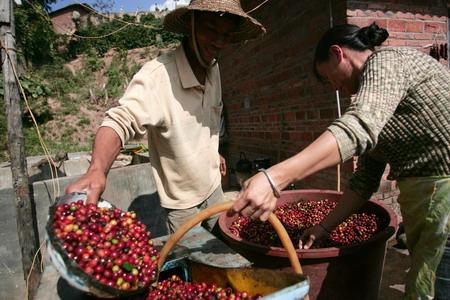
Workers check beans at a plantation in Yunnan province. China is gradually developing the coffee habit. [Photo / China Daily]
BEIJING -Yunnan province is home to the eponymous Pu'er tea - favored by connoisseurs around the world. But in this scenic mountain region, a quiet race is on for another beverage - coffee.Yunnan has become a key Chinese battleground for the world's major coffee makers including Starbucks and Nescafe who want to get access to the country's prime plantations.
They are vying with local producers to control the supply of coffee beans in the southwestern province to cater to the growing population of coffee drinkers in China."Very few places are suitable for growing coffee beans in China, only Yunnan and Hainan provinces, so whoever controls the land will control a limited supply of quality coffee beans, and stand out in the fierce competition," said Zou Lei, vice-president of the China Coffee Association.
"That's why so many coffee distributors are bidding against one another to dominate the upstream products."
Yunnan produces 30,000 tons of coffee annually, contributing about 98 percent of the country's total output.
Starbucks Corp, the world's largest coffee chain, signed an agreement in November with the Yunnan provincial government to set up its first-ever coffee bean farm in order to secure a stable supply of beans.
Development center
The Seattle-based coffee company said it will also establish a coffee development center, farmer support center and processing facilities in adition to the base plantation.
The company has never grown beans on such a massive commercial scale before - currently Starbucks purchases its coffee from farmers in more than 30 different countries.
"Our efforts in Yunnan demonstrate Starbucks' ongoing commitment and investment in building China into our second home market outside the United States," said Starbucks Chief Executive Howard Schultz without giving any specific details on the investment.
"It will strengthen the foundation of Starbucks China by completing our entire value chain - from coffee seed to the high-quality, freshly-brewed coffee."
Starbucks launched a special coffee line with whole beans grown in Yunnan last year called South of the Clouds Blend, a literal translation of Yunnan. The coffee is only available in China, Malaysia and Singapore.
"It's a strategic move for Starbucks not only because of the growing concern about the soaring coffee price this year, but also the huge potential of China's booming market," Zou said.
China, a tea-drinking nation, is developing a thirst for coffee, mainly due to an increase of the country's young urbane drinkers who are accustomed to Western lifestyles.
Many Chinese drinkers picked up the habit while living abroad and have brought it back home with them.
"I cann't do anything until I have my first coffee in the morning," said Cui Jiannan, 27, who had lived in the US for five years. "Drinking coffee in the US is just like having tea in our country. After living there for so many years, it's now a part of my life to sit in a coffee shop talking and meeting new friends."
Coffee giants fight
Since opening its first store in 1999 in Beijing, Starbucks has expanded to 800 stores in China and the number will increase soon to more than 1,000, according to Schultz.
However, Starbucks is not the first company to have its eyes on Yunnan. Other coffee giants, such as Nestle SA and Maxwell House, a unit of Kraft Foods Inc, have purchased coffee beans from the province for decades.
Nestle, the world's largest food company by sales, is the first international company to establish a coffee processing plant in China.
The Swiss-based instant coffee powerhouse dominates about 80 percent of China's coffee market after stepping into the market more than 20 years ago and developing the business, said Adrian Ho, head of the coffee and beverage business unit at Nestle (China) Ltd.
The Nestle experimental and demonstration farm was established in 1997, covering an area of 60 hectares and started direct large-scale procurement of Arabica coffee from local farmers from 2002.
So far, Nestle has invested about 50 million yuan ($7.51 million) into training local farmers to improve the quality of Arabica coffee and the yields of their plantation.
The initiative helps the company build a strong relationship with the coffee bean suppliers, most of whom are local farmers.
"I think it's not easy for someone outside to come and buy coffee, despite the fact that the prices always do something and it could be that you offer a high price and someone will sell it to you," said Wouter De Smet, manager of Nestle Coffee Agriculture Service (NAS), who has been living in Pu'er city, Yunnan, for about six years.
"But as I said, the relationship with the suppliers cannot be built overnight. Our linkage with local farmers is very strong and it helps us get access to high quality beans."
Fierce competition is brewing in China. Starbucks plans to offer its first instant coffee product, Via, which the company spent 20 years developing in China, but the coffee maker has not settled on a date, as Schultz told the Wall Street Journal earlier.
"Consumers here need to develop a better understanding of the coffee culture first," he said.





